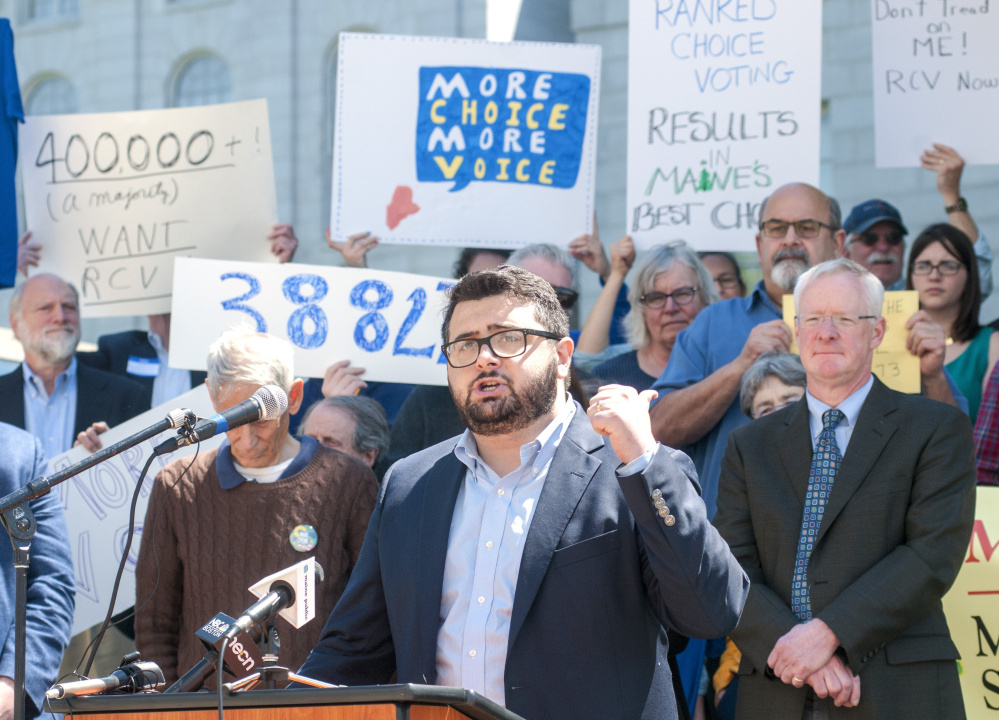AUGUSTA — The Maine House and Senate passed conflicting versions of ranked-choice voting legislation Tuesday, making the future of the first-in-the-nation, voter-approved measure uncertain.
The Senate voted Tuesday morning to repeal the ranked-choice voting law. The 21-13 vote came after the state’s highest court gave an advisory opinion that electing members of the Legislature and the governor by ranked choice did not comply with the Maine Constitution, which calls for the winners of those elections to be selected by a plurality of voters.
But just moments after the Senate action, and with no debate, the House of Representatives voted 79-66 to leave parts of the law intact for primary voting and congressional elections. The House bill also leaves open the door to ranked-choice voting for governor and the Legislature if a constitutional amendment is passed in the future.
The House bill should please supporters of the new law, who said lawmakers should implement the parts that were not viewed as unconstitutional by the Maine Supreme Judicial Court in May.
The court issued its unanimous advisory opinion after the Maine Senate asked it for guidance in February.
“The object must always be to ‘ascertain the will of the people,’ ” the court wrote of the ranked-choice initiative approved by voters. “Nonetheless, when a statute – including one enacted by citizen initiative – conflicts with a constitutional provision, the constitution prevails.”
The advisory opinion itself didn’t negate ranked-choice voting. Only a legal challenge in the courts could do that. But the justices did spell out the Legislature’s options, noting that lawmakers could vote to repeal the measure or to initiate the process that leads to a constitutional amendment to support ranked-choice voting.
But an effort to send the law back out for a constitutional amendment – which would have to be approved by voters in a statewide referendum and then supported by a two-thirds vote of lawmakers – failed in the Legislature last week.
Opponents of the law have argued that implementing two different types of voting systems in Maine will be costly and confusing for the state and municipal voting officials and volunteers.
Others have said voters were misled when they were told by the Committee for Ranked Choice Voting, which backed the ballot measure, that the new law was fully constitutional, when it turned out it wasn’t.
Under the ranked-choice system, voters would rank candidates in order of preference. If no candidate had more than 50 percent of votes, the candidate with the fewest votes would be eliminated. Voters who chose the eliminated candidate would have their ballots added to the totals of their second-ranked candidate, and the ballots would be retabulated. The process would continue until one candidate had a clear majority and was declared the winner.
Sen. Ben Chipman, D-Portland, said his city has used ranked-choice voting for its mayoral elections for six years and neither voters nor election officials have had any problems using two different voting systems.
“We thought it was going to be very complicated and very difficult when we tried to implement this system to have ranked-choice voting on one side of the ballot and non-ranked-choice voting races on the other side of the ballot,” Chipman said. “Turns out that didn’t happen.”
But Sen. Bill Diamond, D- Windham, a former Maine secretary of state who was responsible for statewide elections, said two systems would be too complicated and costly to implement statewide.
“To try to do two fundamentally different election systems at the same time, not only is that not practical, it’s totally unfair to everybody back home that works so hard to make our elections work,” Diamond said. “It just does not make sense that we try to run two elections at the same time.”
Sen. Eric Brakey, R-Auburn, said he supported ranked-choice voting, but as a lawmaker he had sworn an oath to uphold the constitution.
“I’m not willing to support us going into a constitutional crisis nor into an electoral process crisis,” Brakey said, asserting that the only option now is to repeal the new law.
Sen. Shenna Bellows, D-Manchester, said Brakey was only partially right.
“Our role is twofold,” she said. “We need to uphold and defend the constitution, and I do think there is a path forward that will allow us to do that – and second and very important is to uphold the will of the people. We are elected to represent the people, not ourselves.”
More than 388,000 voters, or 52 percent of those who cast ballots on the question last fall, supported ranked-choice voting.
Scott Thistle can be contacted at 791-6330 or at:
sthistle@pressherald.com
Twitter: thisdog
Send questions/comments to the editors.




Success. Please wait for the page to reload. If the page does not reload within 5 seconds, please refresh the page.
Enter your email and password to access comments.
Hi, to comment on stories you must . This profile is in addition to your subscription and website login.
Already have a commenting profile? .
Invalid username/password.
Please check your email to confirm and complete your registration.
Only subscribers are eligible to post comments. Please subscribe or login first for digital access. Here’s why.
Use the form below to reset your password. When you've submitted your account email, we will send an email with a reset code.